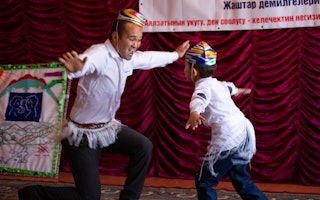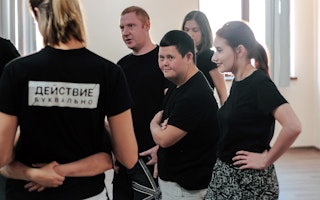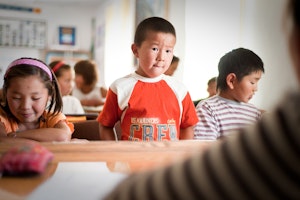Kazakhstan’s Neglected Children
By Aigul Shakibayeva

In my hometown of Kostanay, Kazakhstan, a new mother’s release from the hospital is usually a happy occasion, replete with flowers, balloons, and other symbols of optimism and joy. Encircled by supportive and welcoming medical professionals—as well as beaming members of her family—a new mother can daydream about her child’s bright future while she readies herself to begin a promising new chapter in the story of her life.
My experience was different. When I think of the moments immediately following the birth of my son, I am not reminded of feeling happy or optimistic. Instead, I am reminded of the neonatologist’s examination of the newborn. I am reminded of the terrible mix of confusion and fear that I felt after he told me that my new son had Down syndrome. I am reminded of feeling as if my future had just been brought to a swift end.
At that moment, I needed time to cope with a situation that was beyond my control. And I needed support. Either from other parents of children with Down Syndrome or from a mental health expert who could guide me through my disorientation and help me realize that I would always love my son for exactly who he is. The messages I actually received, though, were quite different. They told me to abandon my son—and they were coming not just from my family and friends, but even from the medical staff itself.
I still remember, for example, the way the head of the hospital’s newborn pathology department asked me if I had decided to keep my baby. Her speech was emotionless, harsh. It was as if she was talking about an object rather than a human being. Now that I have worked with other families in my situation, I know my experience was all too common. But such inhumanity towards children still leaves me perplexed.
Throughout the years following my son’s birth, I have devoted myself to advocating for the rights of people with Down syndrome and their families. My partners and I have had our work cut out for us, too. We’re proud of our achievements—especially the help we’ve been able to give to parents who try to keep their children in mainstream schools—but too many children are still being placed in neglected and alienating institutions. And too many parents still aren’t getting adequate social services support from the state.
Kazakhstan, it’s true, is a signatory to the UN Convention on the Rights of Persons with Disabilities. But because the convention relies on national legislation, implementation has been left to Kazakhstan’s government. The result has been some relatively minor changes to make public spaces more accessible, with the majority of people with disabilities remaining shut away, denied an education, and unable to become fully involved and included members of their community.
Many reforms are badly needed. But one of the most obviously necessary, as well as relatively easily accomplished, would be to change the processes used in Kazakhstan to determine the supports and services a child needs to be fully included. At present, the criteria used only focuses on medical—and not mental or social—factors. This is an excessively narrow approach, one which leaves many families without the social services they need to ensure their children are able to participate fully in the community.
In fact, supporting children with disabilities so they can enjoy their human rights is what our work is all about. We’re not asking for special privileges; we are simply demanding the state to live up to the standards of a UN convention which it’s ratified already. The loneliness I experienced after the birth of my son is something no mother should have to go through. And no parent should have to worry that their child’s future will be defined by institutionalization, isolation, and neglect. That is why I am fighting for these children with everything I have—and it’s why I will never quit.
Aigul Shakibayeva is a grantee of the Open Society Foundations.
Aigul Shakibayeva is a former teacher and current disability rights activist.


